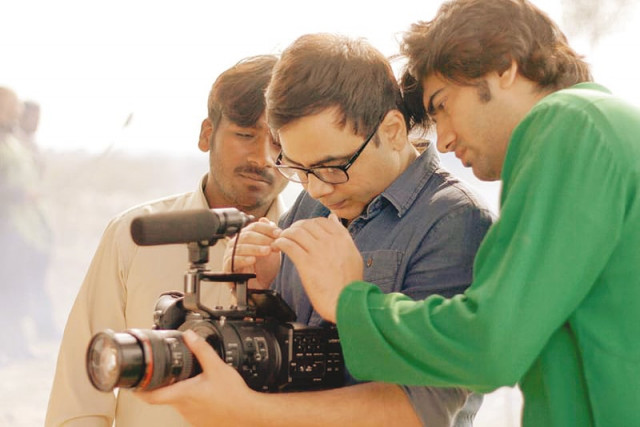Between a rock and a hard place
Beygairat Brigade frontman tones down satire for latest song ‘Kithay Reh Gaye’ about minority rights in Pakistan

Saeed says the green stripes on the mob’s kurtas represent how they are not real Pakistanis, as a real Pakistani would never harm a member of a minority. PHOTOS: PUBLICITY
Almost a week before the release of their latest single ‘Kithay Reh Gaye’, Ali Aftab Saeed posted the video of ‘Dhinak Dhinak’ on the band Beygairat Brigade’s Facebook page. The song, which satirises the military for their frequent imposition of martial law, wasn’t received well by the authorities. Its social-media life was cut short, as it was taken down only a few days after it was posted. But despite the setback, Saeed has not shied away from talking about other grave issues plaguing Pakistan. With his latest release ‘Kithay Reh Gaye’, he highlights the plight of minorities in the country.

“The song talks about how we should not worry about things, such as giving minorities equal rights by letting them come into power. To hell with all of that! All I’m talking about is letting them live,” says Saeed. He shares that, unlike his previous songs that have been outrightly satirical, he couldn’t afford to put a humorous spin on a topic as sensitive as the state of minorities in Pakistan.
It features Saeed calling for the protection of minorities in a loudspeaker, but his voice goes unheard. The video, which makes smart use of visual effects with pauses in time, shows Saeed singing the song as minorities, dressed in white, run from a mob wearing black kurtas with stripes of green. Explaining the colour selection, he says, “White is traditionally the colour of minorities in Pakistan, but the green stripes on the mob’s kurtas represent how they are not real Pakistanis, as a real Pakistani would never harm a member of a minority community.”

The song, released on the death anniversary of Shahbaz Bhatti, former minister of minorities’ affairs, is the first of two songs about minorities in Pakistan from his album Gao Suno Badlo. The second song, he shares, is a celebration of minorities in the country and will release on August 11.
So far, the song has received minimal coverage on television channels, something that Saeed laments, not only as an artiste but also as a human being. Only two television channels have run the music video, with others refusing to air it. “Artistes and people are afraid to talk about such issues in their songs. Forget about artistes, even media outlets and channels are scared of promoting such work on TV, saying that such sensitive topics might spark outrage,” laments Saeed.
Having already been deprived of airtime, as is what happened with his song ‘Dhinak Dhinak’, Saeed admits, “Although I like to play it cool, I get scared when the authorities pull down our work.” But he remains unfettered as he feels these things are a part of the musician’s life, and that it’s important to not get bogged down by them, since doing one’s best eventually pays off. “Being an artiste, it’s my responsibility to keep pushing the boundaries. For instance, we started by doing satire on different topics, which later became a part of serious discourse on television,” noted the Beygairat Brigade frontman.

He validates this citing the example of his debut release ‘Aalu Anday’, which centralised topics, such as the extension of former Chief of Army Staff Ashfaq Parvez Kayani’s term, and Pakistan’s first Nobel laureate Abdus Salam. “After the release of the song’s video, General Kayani’s extension became a point of discussion on news channels, many of which also revisited the life and work of Pakistani theoretical physicist Abdus Salam,” says Saeed.
Published in The Express Tribune, March 4th, 2015.
Like Life & Style on Facebook, follow @ETLifeandStyle on Twitter for the latest in fashion, gossip and entertainment.



















COMMENTS
Comments are moderated and generally will be posted if they are on-topic and not abusive.
For more information, please see our Comments FAQ